A recent article in "The Conversation" offers an interesting perspective on this "Polycrisis."

A Drop in the Bucket, March 1, 2023
Several years ago, as an novel way to teach large numbers we compiled an exercise for our class describing some twenty major disasters from the past. Some were man-made, others natural. To the latter category we could now add the devastating earthquakes in Syria and Turkiye. The death toll has exceeded 50,000 and is steadily climbing. These horrific shocks highlight the fragility of life on our planet, as did the asteroid that wiped out the dinosaurs long ago. Such natural disasters, like the earthquake in Haiti (2010), the tsunami of Southeast Asia (2004), the earthquake and tsunami in Fukushima, Japan (2011), and uncountable others, are difficult to predict and impossible to prevent.
|
The Four Dhamma Summaries: The world is swept away. The world offers no shelter. The world has nothing of its own. The world is insufficient, insatiable, --Majjhima Nikaya 82 |
|||
The quake damage in Syria has been even more horrific because of the prior devastation wrought by the civil war, the number of already homeless and destitute refugees, the destruction of so much infrastructure, and the tangled politics that have delayed and complicated emergency relief.
The cyclone in New Zealand has been labeled "the storm of the century" in that country. It devastated a nation that has led the world in peace, social equality, prosperity, and environmental protection. Some might be tempted to equate the cyclone with earthquakes, but scientists know that, these days, cyclones, typhoons, hurricanes, and tornadoes, as well as snowfall, rainfall, floods, freezing temperatures, heatwaves, and bush and forest fires, are all more extreme, erratic, and destructive because of climate change/catastrophe. The heatwaves in Europe; the floods in Pakistan; and the wildfires in Chile, the American West, Greece, Algeria, and Siberia; as well as the melting of the Arctic tundra and Antarctic ice, can all be blamed on man's violation of nature and rape of the environment.
The war in Ukraine, which has just passed the one-year mark, is the latest chapter in the almost continuous warfare throughout human history. The military death toll was estimated to be well over 300,000 from both sides at the end of last year. The Russian troops are sometimes described as mere "cannon fodder" by the Ukrainians. Poorly trained conscripts, as well as convicts recruited from Russian jails are often deployed on near-impossible missions with shoddy arms and materials. As for non-military deaths, some 30,000 to 40,000 civilians have lost their lives nationwide in the conflict, Western sources say.
Have we learned nothing from "The War to End All Wars" (WWI), WWII, Korea, Vietnam, Afghanistan, Iraq, etc.? Actually, there are said to be about 600 conflicts, major, minor, and local, taking place in the world today. Some of the most noteworthy are Myanmar (Burma), Yemen, Syria, Israel/Palestine, and the Democratic Republic of Congo. These are all completely man-made disasters, originating in greed, hatred, ignorance, and the delusion of ego--the very roots of the violent nature of so many human societies.
Due to the Russian/Ukraine conflict, the Doomsday Clock is closer than ever before to the black midnight of nuclear devastation. One slip, one word too far in the stand-off between NATO and Russia, could release utter and complete destruction of "intelligent" life on our benighted planet.
These three events--earthquakes and tsunamis (both natural), devastating storms in this age of Climate Catastrophe (a combination of natural and man-made), and war (entirely intentional and man-made), make one wonder whether humankind will survive much longer. Which type of disaster will bring about the doom of life on earth?
And, of course, there's this unavoidable truth: the inevitability of death. On a personal level--this profound picture from Ven. Tsundue
 |
||||
|
Understanding Death Death can be understood by the shortness of the lifespan. Many die at birth or in their youth. Those who live to fifty years, live long. Fewer live to be seventy or eighty. Rare, indeed, are those who live to ninety or one hundred. Know death by the weakness of the life force. Life needs water and food. Life is dependent upon air. Understand death by knowing that this body is shared by many others. It is a home to many others. Understand death by its absence of signs. There is no sign to indicate when death will come--in the morning, in the afternoon, or at night. There is no sign to tell us where one will die--at home or away from home; in the air, on earth, or in the water. The way death will come is also unknown--from illness, by accident, or by an enemy's hand. Understand death by knowing that all health ends in sickness, that all strength ends in weakness, and that all success ends in failure. Know that death comes to all. The most powerful ruler, the richest person, the general, the head of a great family, and even the Buddha himself must die, so how can I hope to be spared? As a turning wheel touches the earth at only one point, so, too, should life be understood. The present moment arises, persists, then passes away. Death comes to each moment, and, likewise, to each life, which arises, stays a bit, then passes away. |
||||
 |
|||
Why are we surprised? Buddha taught that samsara, this worldly life rolls on because of greed, hatred, and delusion and that its fundamental nature is suffering and change. That's not pessimism--it's realism!
In spite of all this, many "experts," as well as ordinary citizens, long for a return to normalcy. Being realistic, we must wonder what "normalcy" might be. We could look back to the relative peacefulness, stability, and sense of hope in the fifties and sixties, but can you remember hearing Ronald Reagan, every Sunday night on GE Theater, declaring, "Progress is our most important product"? Look where progress has taken us! We also had DuPont intoning, "Better Living Through Chemistry." Chemistry has given us Agent Orange, Bhopal, Love Canal, the water in Flint, innumerable toxic spills, bee-colony collapse, endangered butterfly species, plastic pollution, and so much more.
An (almost) uniquely American problem, but one which constantly shocks the entire world, is gun violence and mass-shootings, particularly at schools. Faced with these disasters, one can only ask,"When will we ever learn?" Of course, this refrain from "Where Have All the Flowers Gone?" refers to war, but, for Americans, the question is all too relevant to this social issue. Visakha did her graduate studies at MSU. We have friends with kids and grandkids enrolled there. There was the headline, briefly, on the news--"An active shooter on the MSU Campus, East Lansing, MI." It shouldn't have been surprising, but it was. What was even more disturbing, appalling, and infuriating, though, was the news that several students who had to hide and shelter in-place had survived earlier shootings--two in Oxford, MI, and one at Sandy Hook. Words fail.
A recent article by Abby Zimet clearly expresses the urgency of action on gun control.
With this grim observation as a backdrop, let us examine a situation closer to our adopted home--the crisis in Sri Lanka. Here we have another type of disaster--an economic crisis, created entirely by inept and greedy politicians and leaders. The nepotism and corruption of the previous administration, in which the current President was Prime Minister, completely bankrupted what had been something of a model of development and prosperity in Asia and throughout the Third World. This beautiful and (now) peaceful island nation is suffering from massive food insecurity, a severe lack of medicine, a serious "brain drain" as doctors and other educated professionals flee the country seeking stability, jobs and security. Businesses are failing due to a ban or restrictions on imports. Unfortunately, the current government, while professing to rectify the mistakes of the past, is exacerbating the problem by taxing the poor, raising the price of essential commodities or allowing prices to rise by removing restrictions, and abandoing the 75-year tradition of universal public education. Many government policies appear to restrict citizens' rights--severe curbs on protests, abuse of the Prevention of Terrorism Act, the apparent postponement of elections, and the manipulation of the Supreme Court, just to name a few.
 Like so much of the world, "The Democratic Socialist Republic of Sri Lanka" seems to be turning toward fascism. A headlong rush to outright fascism is certainly the case in the United States, where books are increasingly banned and the rights of women, gays, and various minorities are being stripped away. Fascism is also rearing its ugly head in France, where massive protests are being staged, and in the UK where the nurses' strike continues in the face government resistance. Viktor Orban, Hungary's Prime Minister, may be the most obvious fascist leader in Europe, but Italy has also just elected a Prime Minister from the far right.
Like so much of the world, "The Democratic Socialist Republic of Sri Lanka" seems to be turning toward fascism. A headlong rush to outright fascism is certainly the case in the United States, where books are increasingly banned and the rights of women, gays, and various minorities are being stripped away. Fascism is also rearing its ugly head in France, where massive protests are being staged, and in the UK where the nurses' strike continues in the face government resistance. Viktor Orban, Hungary's Prime Minister, may be the most obvious fascist leader in Europe, but Italy has also just elected a Prime Minister from the far right.
Rather than long for "normalcy," we should envision what should be and strive to make that a reality. There is more than enough of everything to go around. There is no good excuse for hunger or extreme poverty in any part of the world. If we could only learn to care and share! Can we create a world governed with empathy, generosity, fairness, loving-kindness, compassion and gladness at others success; rather than competition, greed, anger, racism, cruelty, and predatory capitalism?
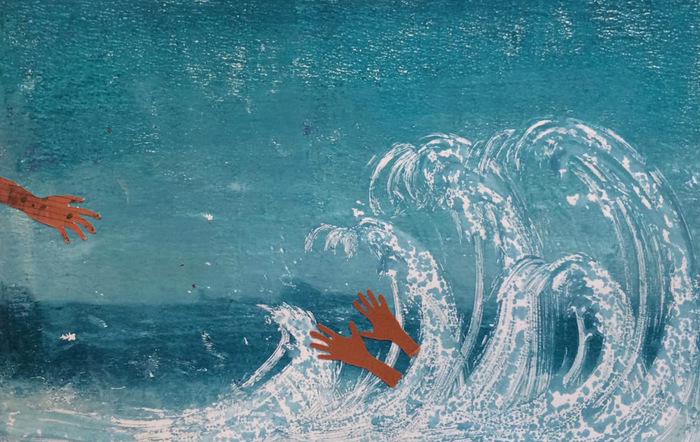 |
||||||||||||||||||||||||
|
11 Ways to Help Others
|
||||||||||||||||||||||||
| Read more | ||||||||||||||||||||||||
|
https://studybuddhism.com/en/essentials/how-to/11-ways-to-help-others
|
||||||||||||||||||||||||
 |
 |
|
If we truly commit ourselves to non-violence, even if peace fails and we lose, we still win because we will have been transformed, become better, closer to the ideal of every religion in this world!
| "Love thy neighbor as thyself!" -- Christianity |
"No one of you truly believes until he loves for his brother what he loves for himself." -- Islam |
The Buddha said: "If beings knew, as I know, the results of sharing gifts, they would not enjoy their use without sharing them with others, nor would the taint of stinginess obsess the heart and stay there. Even if it were their last morsel of food, they would not enjoy it, without sharing it, if there were anyone to receive it." |
How is a person expected to react to all of this news? Of course, one must accept and adjust to natural disasters, but so much of the mess in which is the world finds itself today has been caused by human stupidity and greed. A natural response might be anger--anger at politicians and government leaders for creating such tensions; anger at big business for adhering to predatory capitalistic policies which have fostered pernicious competition (instead of cooperation) and wanton exploitation of the most vulnerable; anger at corporations which have ignored and dismissed scientific reports that have proved the destruction of the environment by chemicals, waste products, and greenhouse gases; anger at high-tech companies for creating extreme artificial intelligence which threatens and dehumanizes us all with drones, robo cops, self-driving machines, surveillance, and much more that we probably don't know anything about
Anger is always counterproductive. It must always be subdued, according to Buddha.
Anger leads to loss of control, lack of mindfulness, and violence, and violence breeds more violence in a cycle of harming. For Christians, it's the 6th Commandment: "Thou shalt not kill." The first precept that Buddhists undertake is not to kill, not to take life. The Buddha approved, however, of killing only one thing--Anger!
Here is a Buddhist parable, retold by Ven. Nyanaponika Mahathero:
News of Our Activities

|
A Drop in the Bucket
|
|||||
| The other evening, while we were watching "Good-bye, Mr. Chips," we got an urgent call from our student, Ven. Mettajiva, who teaches meditation at Ambuluwawa Meditation Centre. He told us that a woman, whom we'd helped before, with two children, aged 3 and 7, and abandoned by her husband, was desperate. She'd confessed to him that she had not been able to feed her children anything that day and that she herself had not eaten for two days. Ven. Mettajiva asked whether we could help. Of course we could. With a donation he had received from some meditators during his last retreat, he could pay the busfare for her to get to Subodharama if Ashoka could take some food there. A quick phone call, and everything was arranged. Ashoka called the Tamil shop, and, the next day, he met the woman at the temple and gave her two parcels of dry rations, a big loaf of bread, a box of biscuits, and a bunch of bananas.
|
|||||
Here are the flyers we have created and posted since our last report. Click any one of the them to view a PDF file of all 28 flyers.
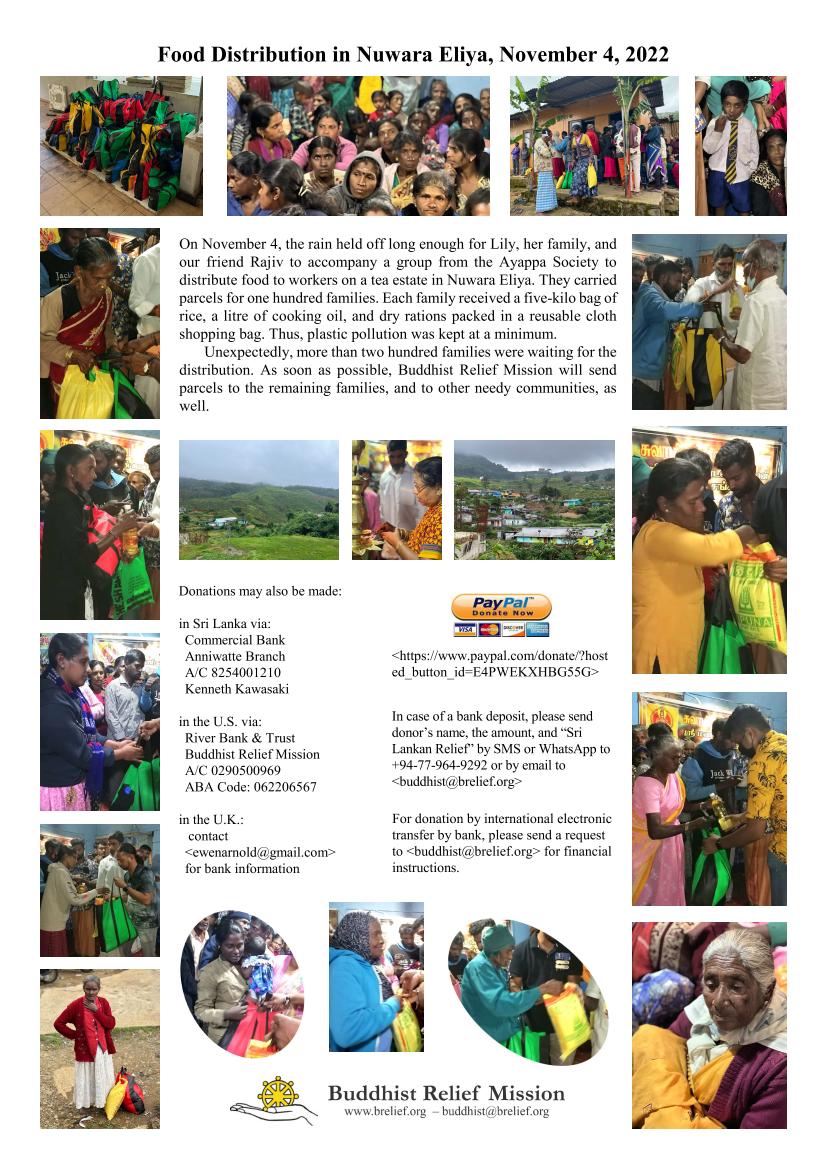 |
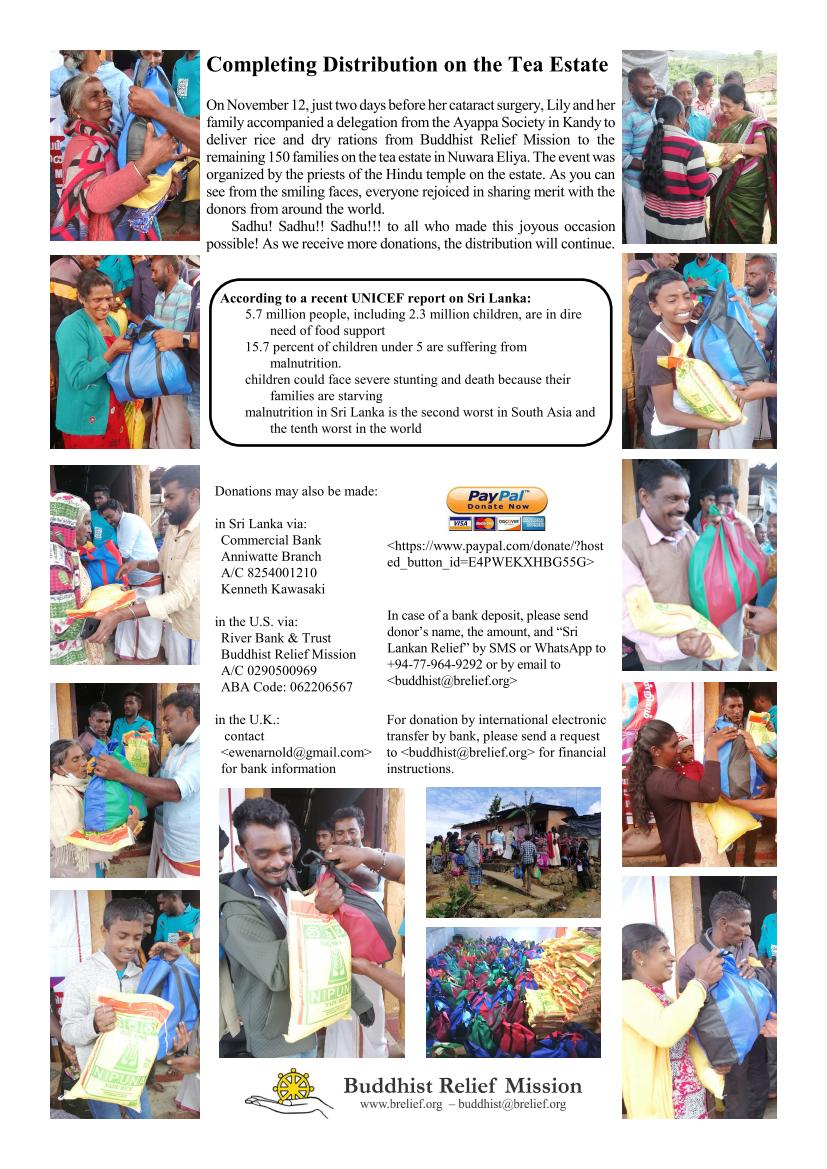 |
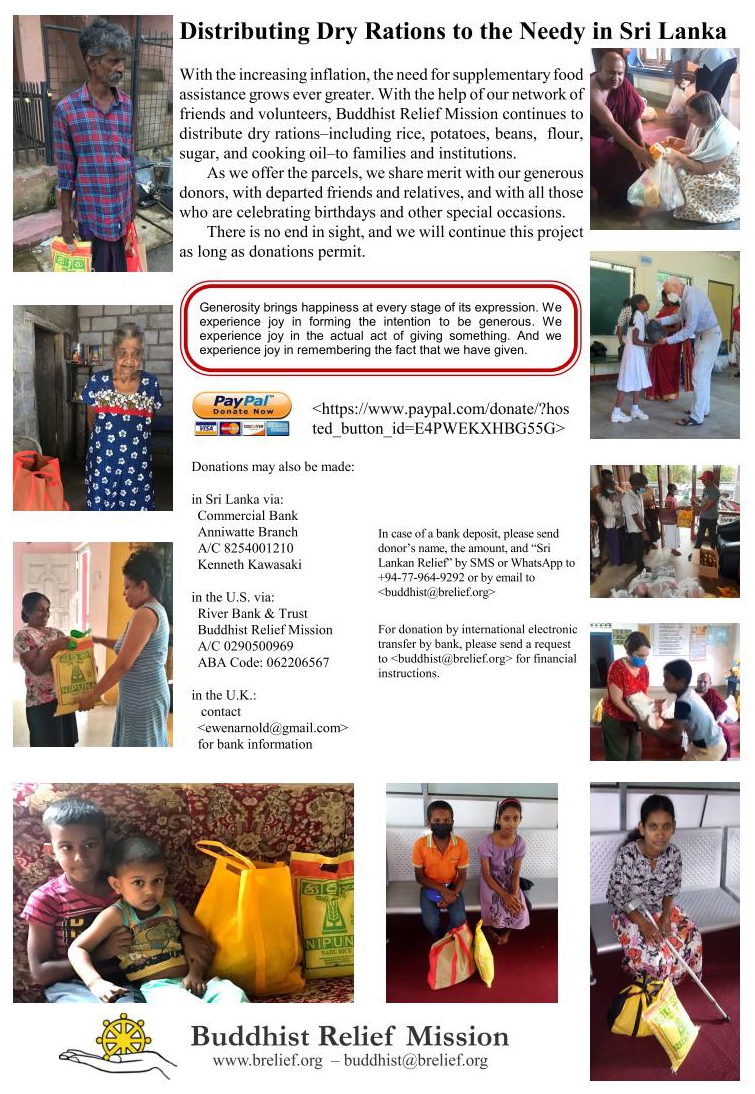 |
 |
|||||||||
 |
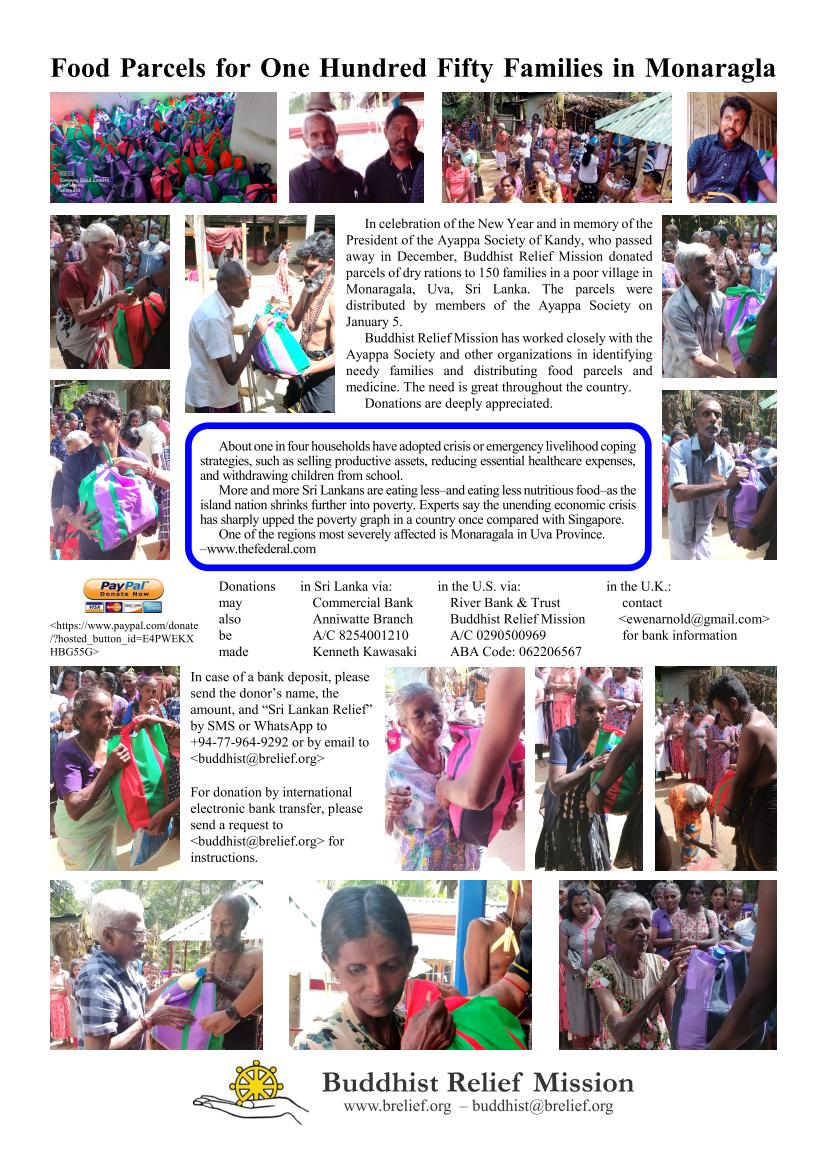 |
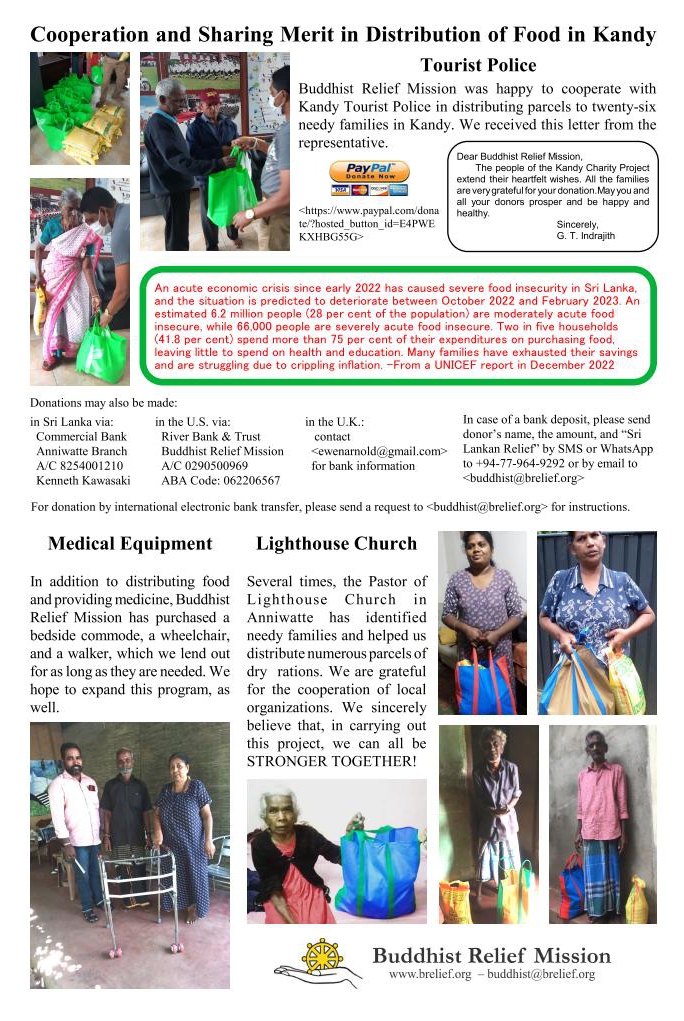 |
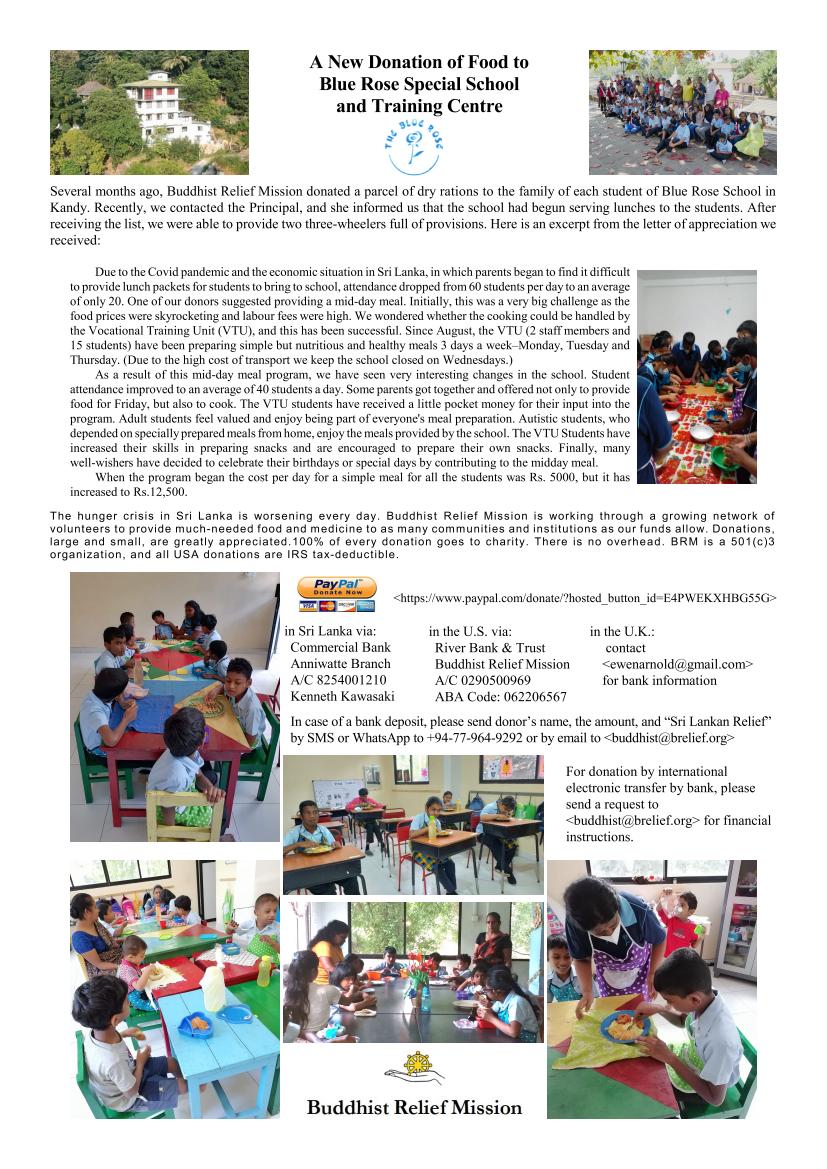 |
|||||||||
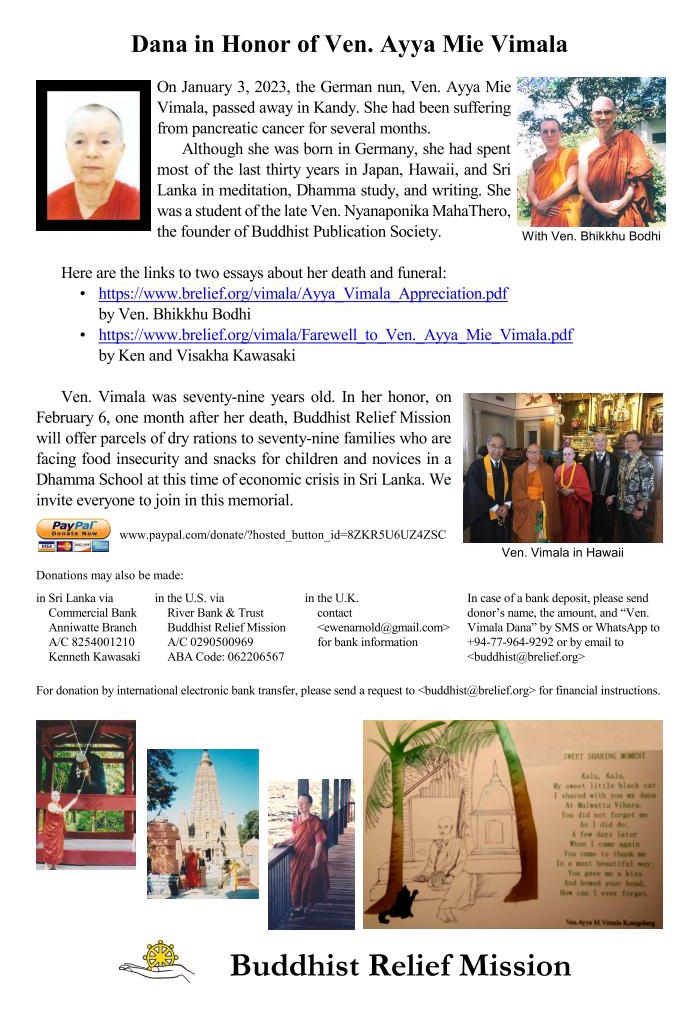 |
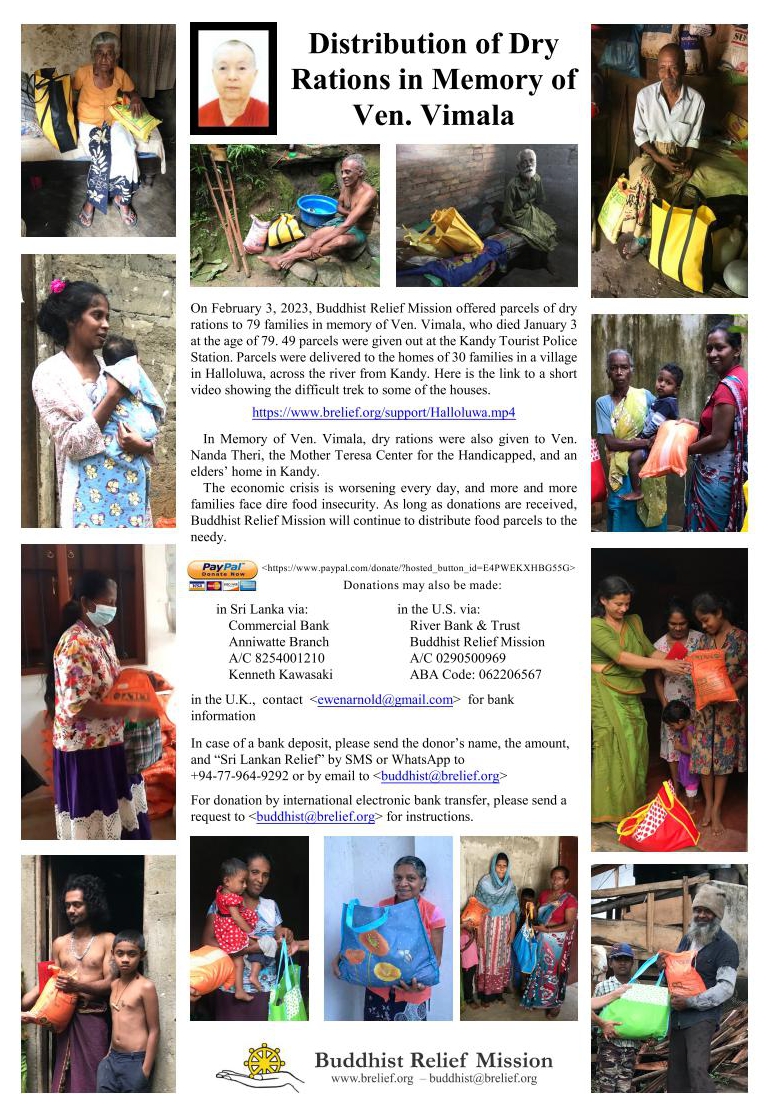 |
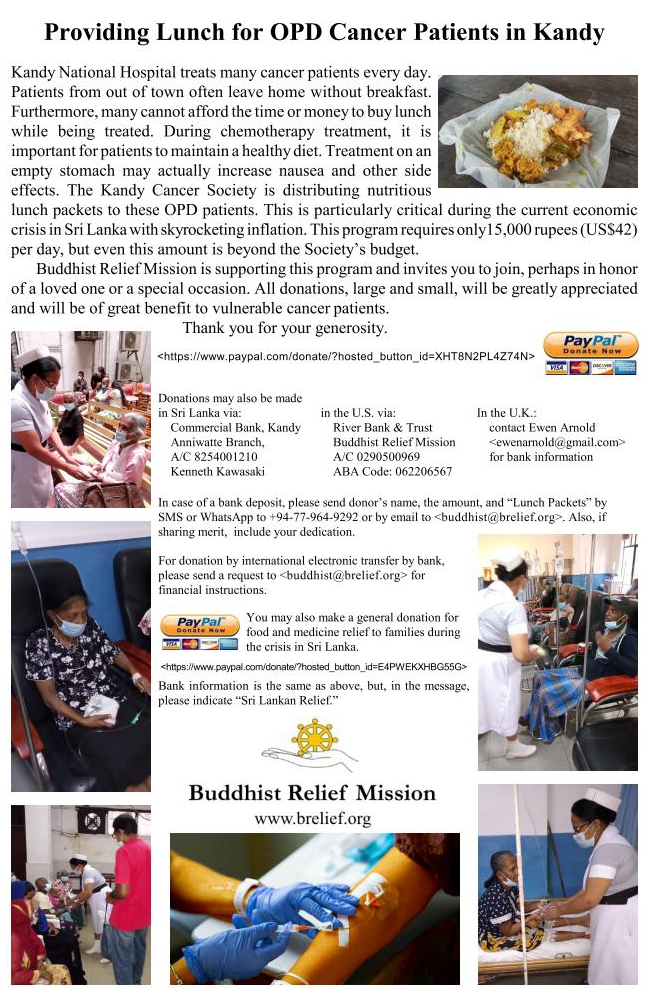 |
||||||||||
 |
||||||||||||
| For donation by bank transfer, see the information on any one of the flyers. | ||||||||||||
| During the distribution described in the "A Community Youth Initiative" flyer above, we learned that Manjula's wife, Hemanthi, was expecting. When the pregnancy became difficult, we helped arrange for them to come to Kandy. Fortunately, Manjula was able to stay with Ewen, who lives near the hospital. The baby was born prematurely and had to spend some time in the PBU, but now they are all back in Kurunegala, and both mother and son are doing fine. |  |
|
At the end of October, Rajiv came from Kolkata and spent a week with us. We had a wonderful time together, catchng up on so many things! He slept upstairs and was engrossed by the library, so we suggested that he choose some books for himself and Visakha, his daughter. He disovered quite a few rare volumes of Burmese history and literature. For Visakha, he chose one volume of our complete collection of Calvin and Hobbes. We were delighted to let him have them. We looked through our closet,and found some Thai jackets for him, Shilar, Abhijit, and Soma. We are seriously trying to dispose of some of our belongings, and Rajiv helped in this way, too. He also joined Lily in the distribution of food parcels at the tea estate in Nuwara Eliya. He has promised to come again as soon as Visakha can get a passport.
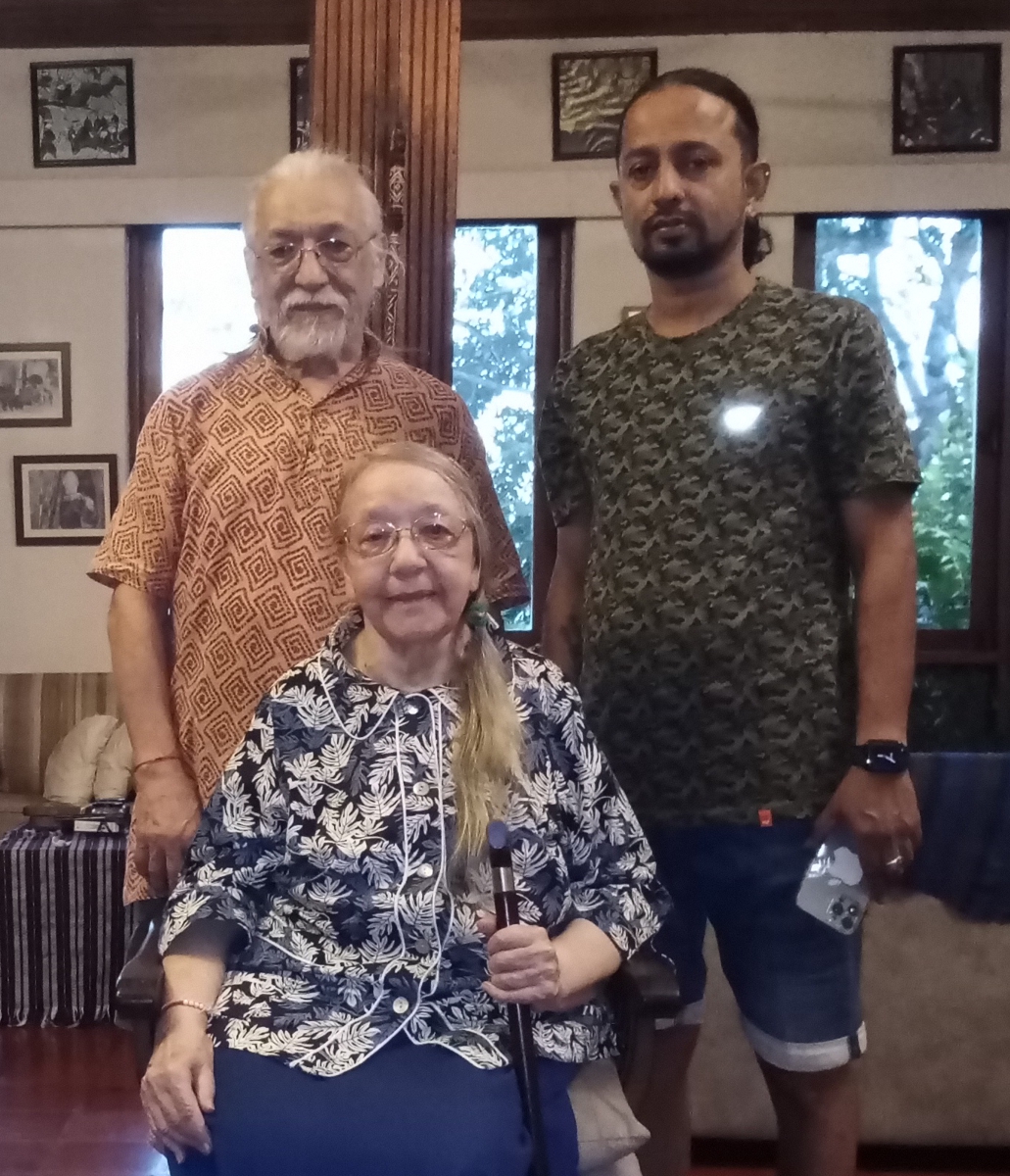 |
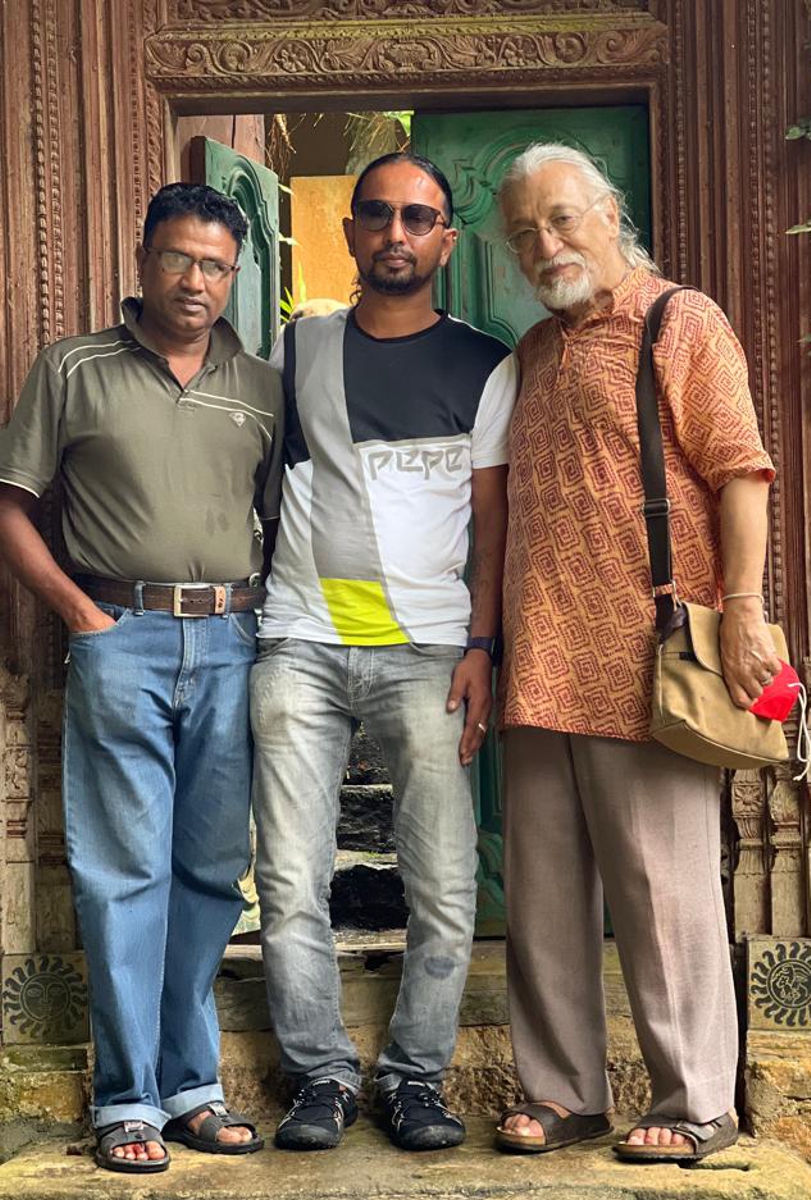 |
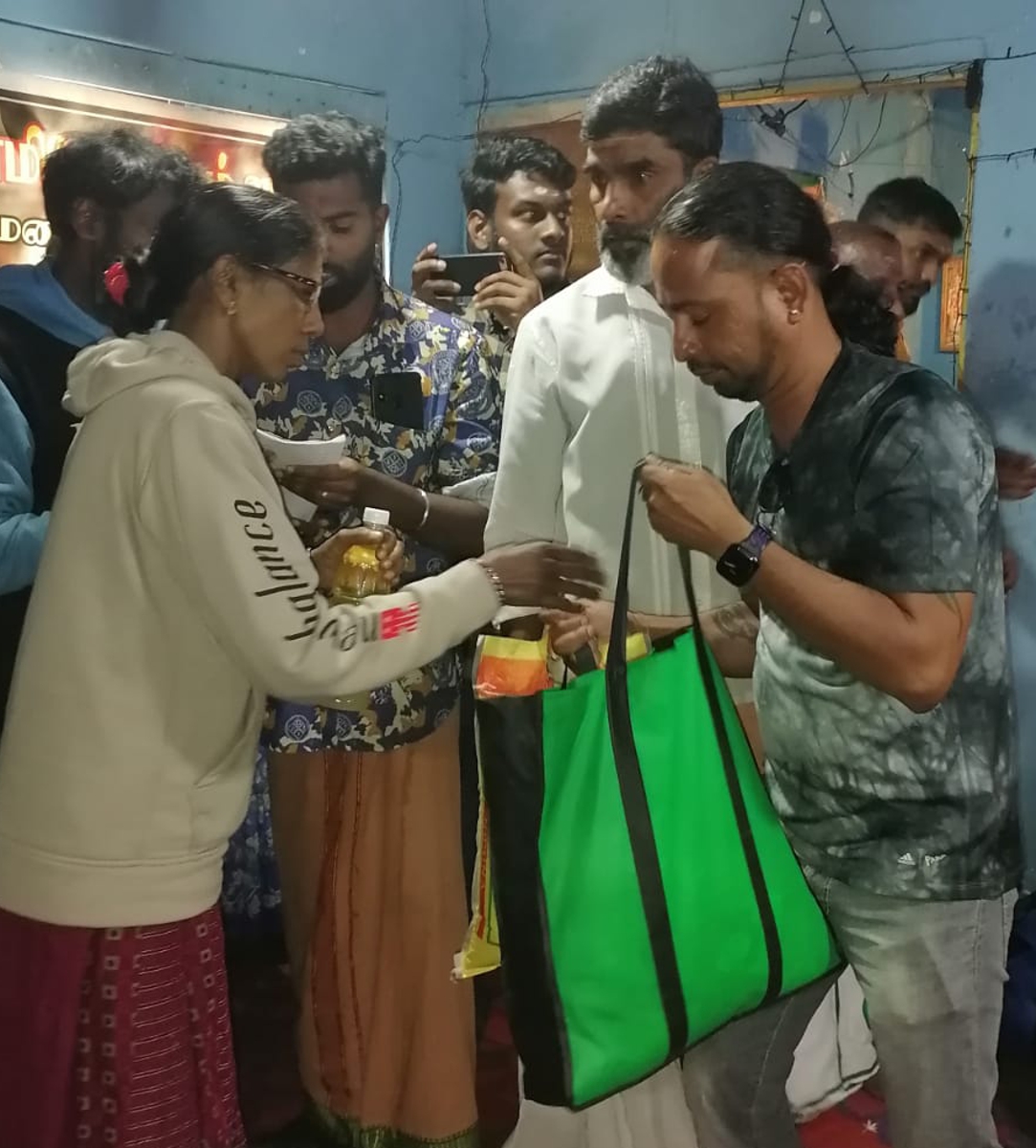 |
|
 |
On January 3, Ven. Ayya Mie Vimala, a German nun whom we had first met many years ago in Japan, passed away in Kandy, after suffering for several months from pancreatic cancer. We had been assisting her in formatting her latest book, German Scholars in the Field of Pali Buddhism and Sanskrit Indology. That book and three of her others are now available for download. Also online are an Appreciation by Ven. Bhikkhus Bodhi and an account of her last days from our perspective. Ken has to apear in court for the third time on March 28 to finalize the procedure regarding her death. We wonder whether that will be the last time or it will drag on for thirty years as land cases often do in Sri Lankan courts. |
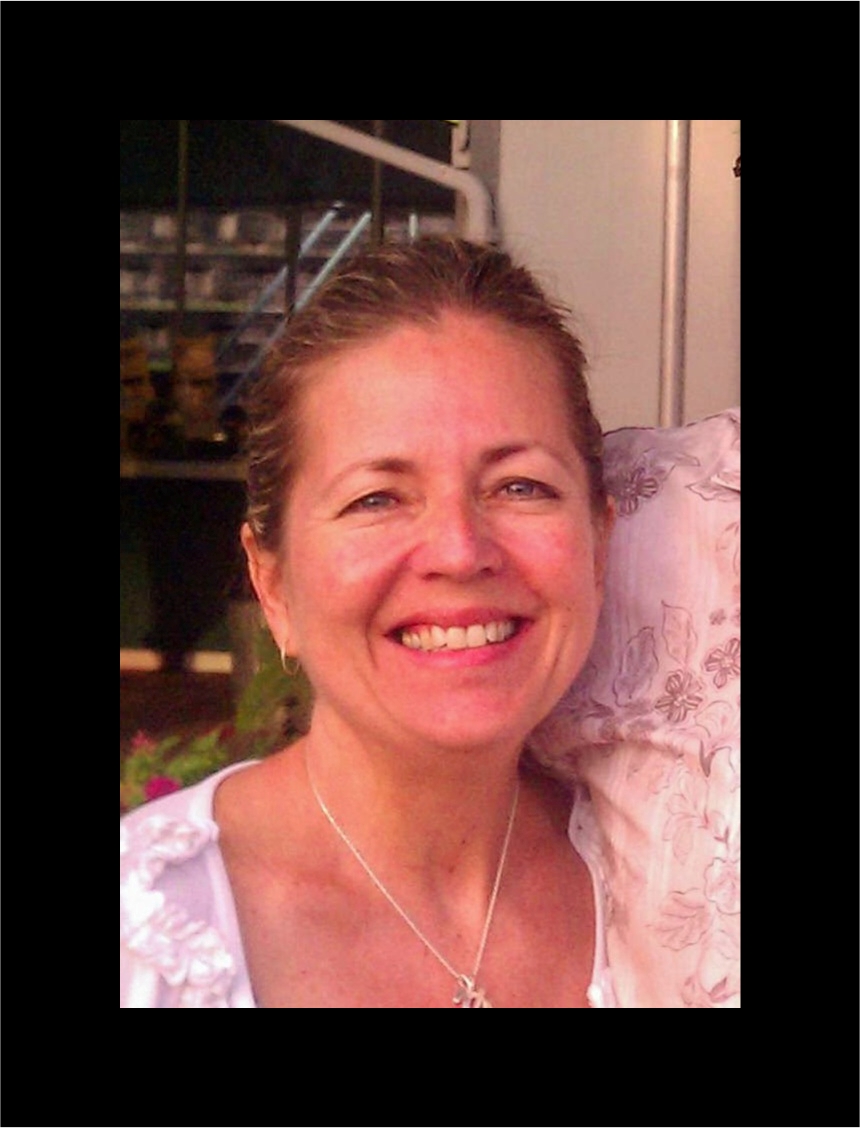 |
||||
|
On January 31, Kame Su Tuttle, the daughter of Ken's sister, Mary Lou, passed away in California. She had been suffering for several years with Parkinson's disease.. This is the message we recieved from David, her elder brother: "From my Brother-in-law, Jack, late last night, regarding my sweet sister, Kame, and, to others, a loving mother, aunt, mimi, niece, cousin, and friend: 'She's in his heavenly arms. Passed very peacefully.' Her long struggle with the corruptible and temporal is finished, and now she shines in the glorious incorruptible fullness of her Creator's love and infinite peace. Love, peace, joy, David C." |
||||||
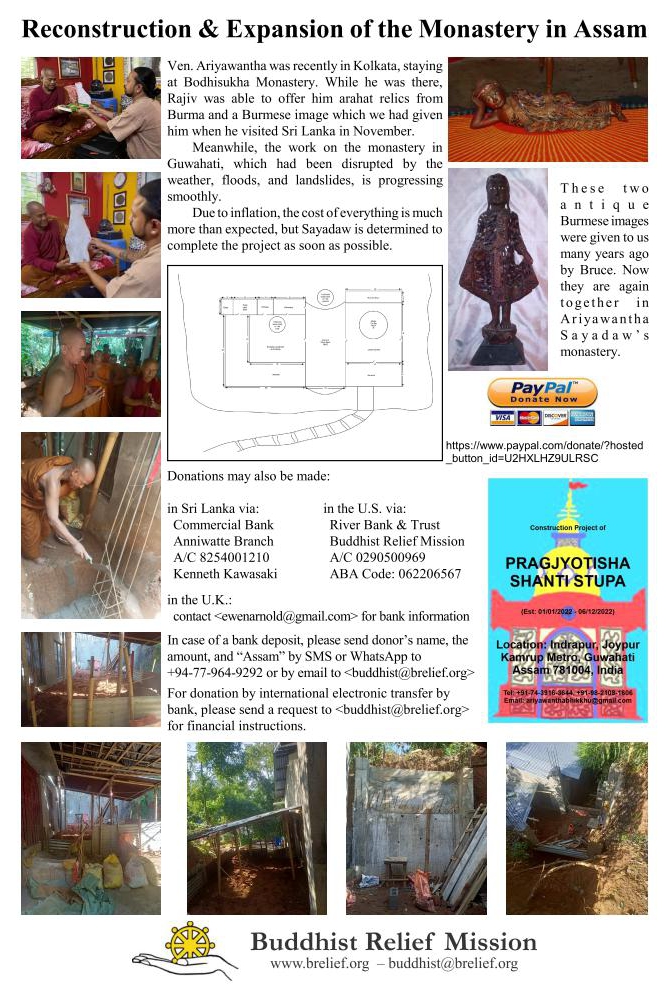 |
|
| Click the flyer to view it larger in PDF. | |
 |
 |
||
 |
|||
Jennie, our friend from Michigan Citizens for Peace, who had come with Dorothy in 2019, returned to Sri Lanka at the begining of February. After touring with Jagath for about a week, she stayed with us for the rest of the month. In addition to helping with our food distribution, she was able to do a lot of painting. Here are some of her works.
 |
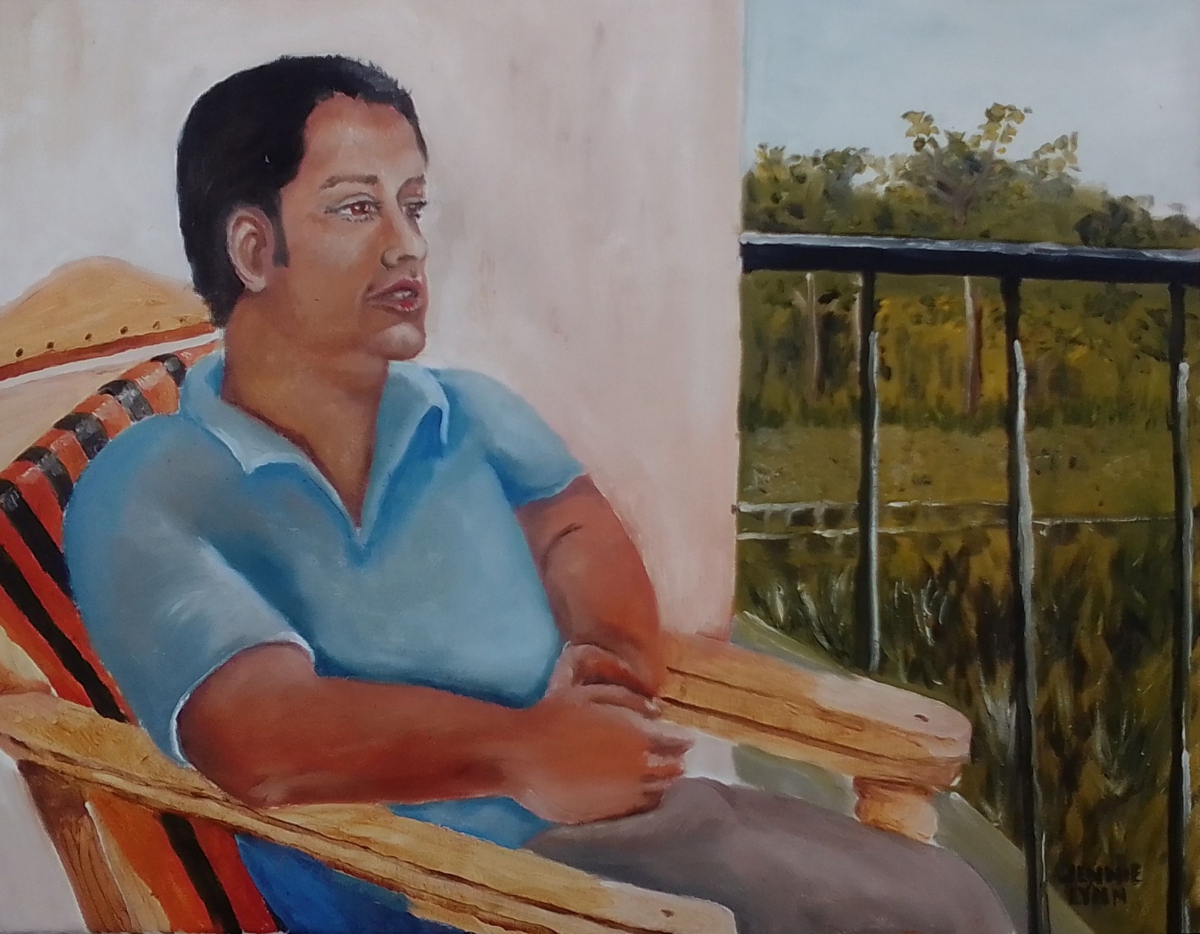 |
 |
||||||
|
Jagath
|
Monkeys on Our Roof Terrace
|
|||||||
 |
||||||||
 |
||||||||
|
A Village Scene
|
||||||||
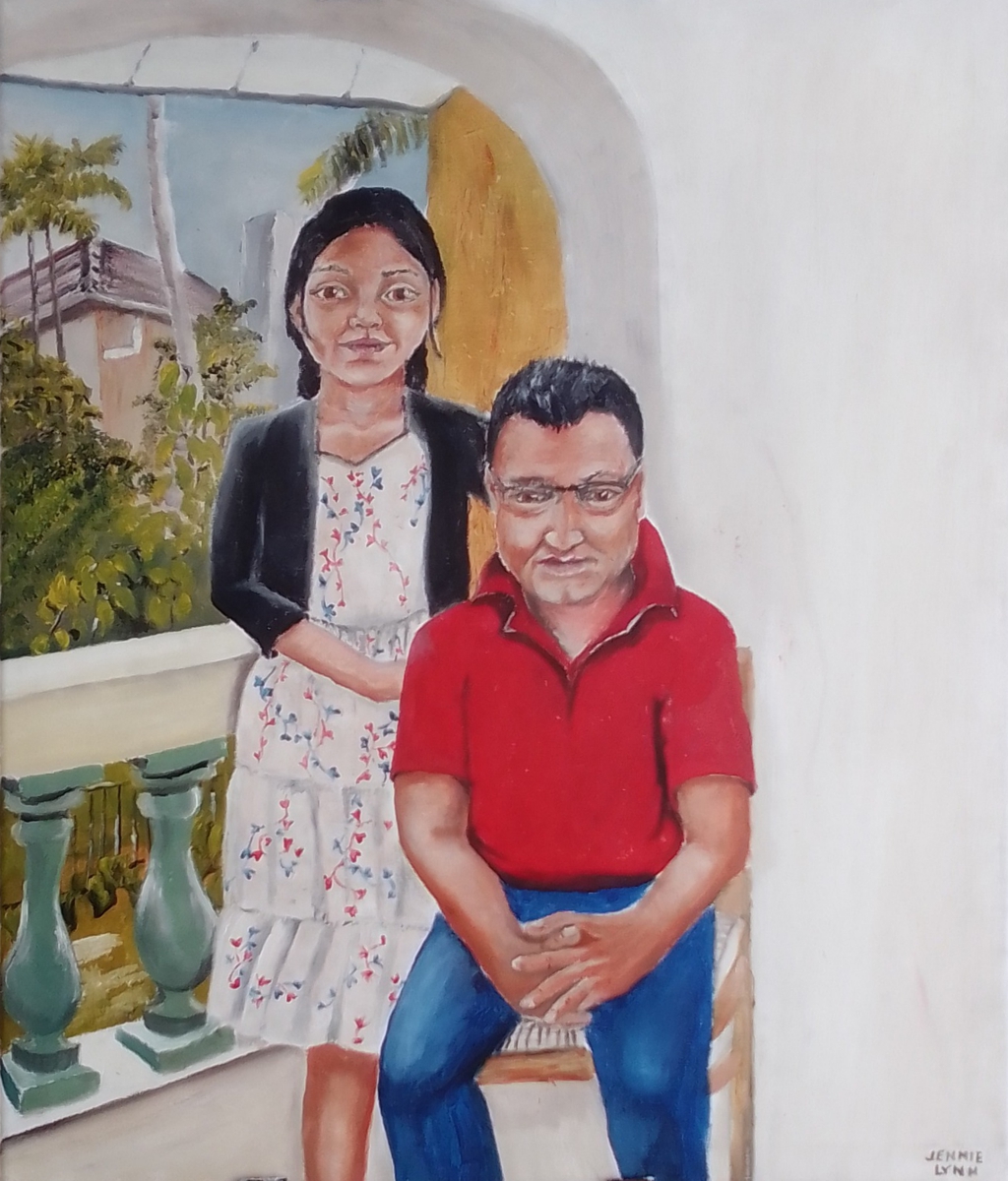 |
||||||||
|
Lily
|
||||||||
|
Samadhi Centre
|
||||||||
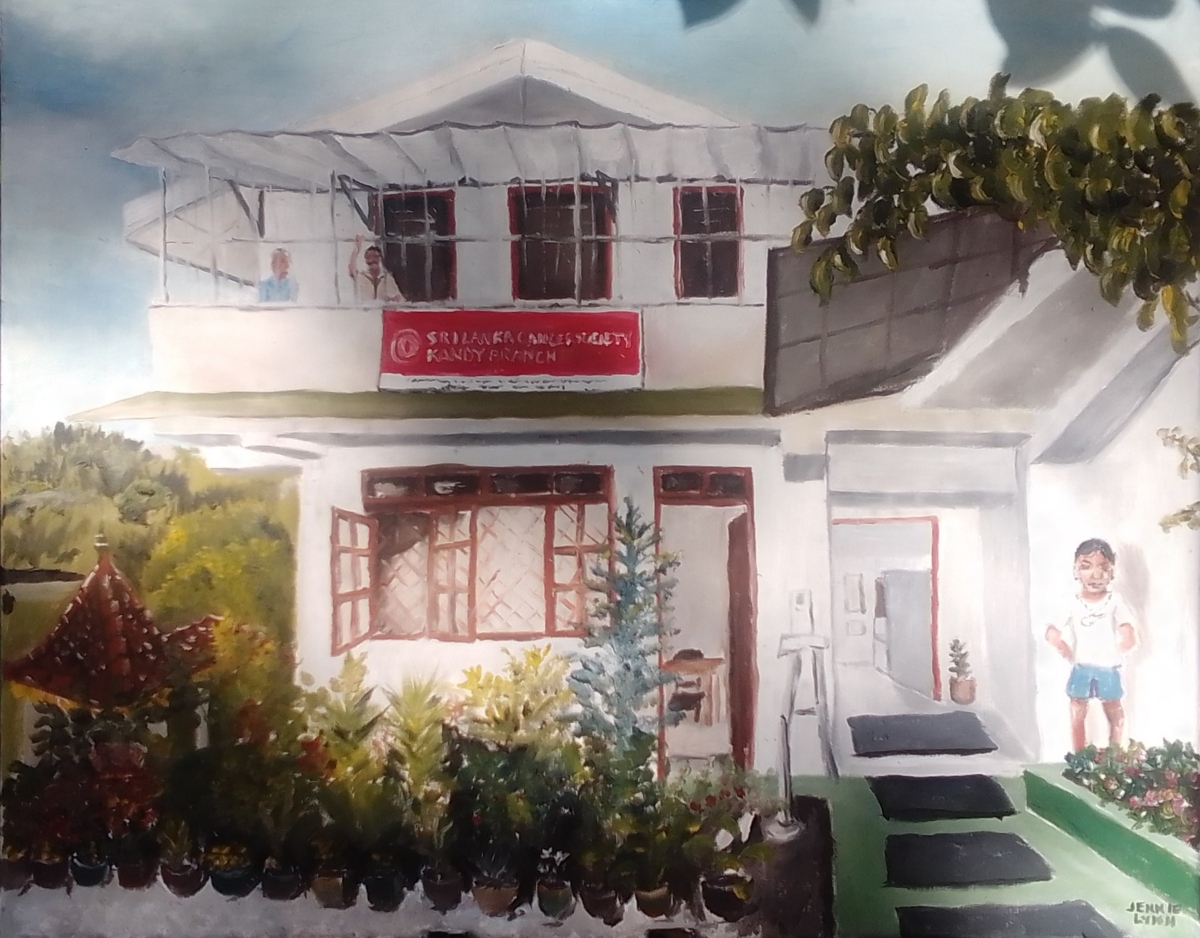 |
||||||||
|
Ashoka and His Daughter
|
||||||||
| Click each painting to view it larger. | ||||||||
|
Kandy Cancer Home
|
||||||||
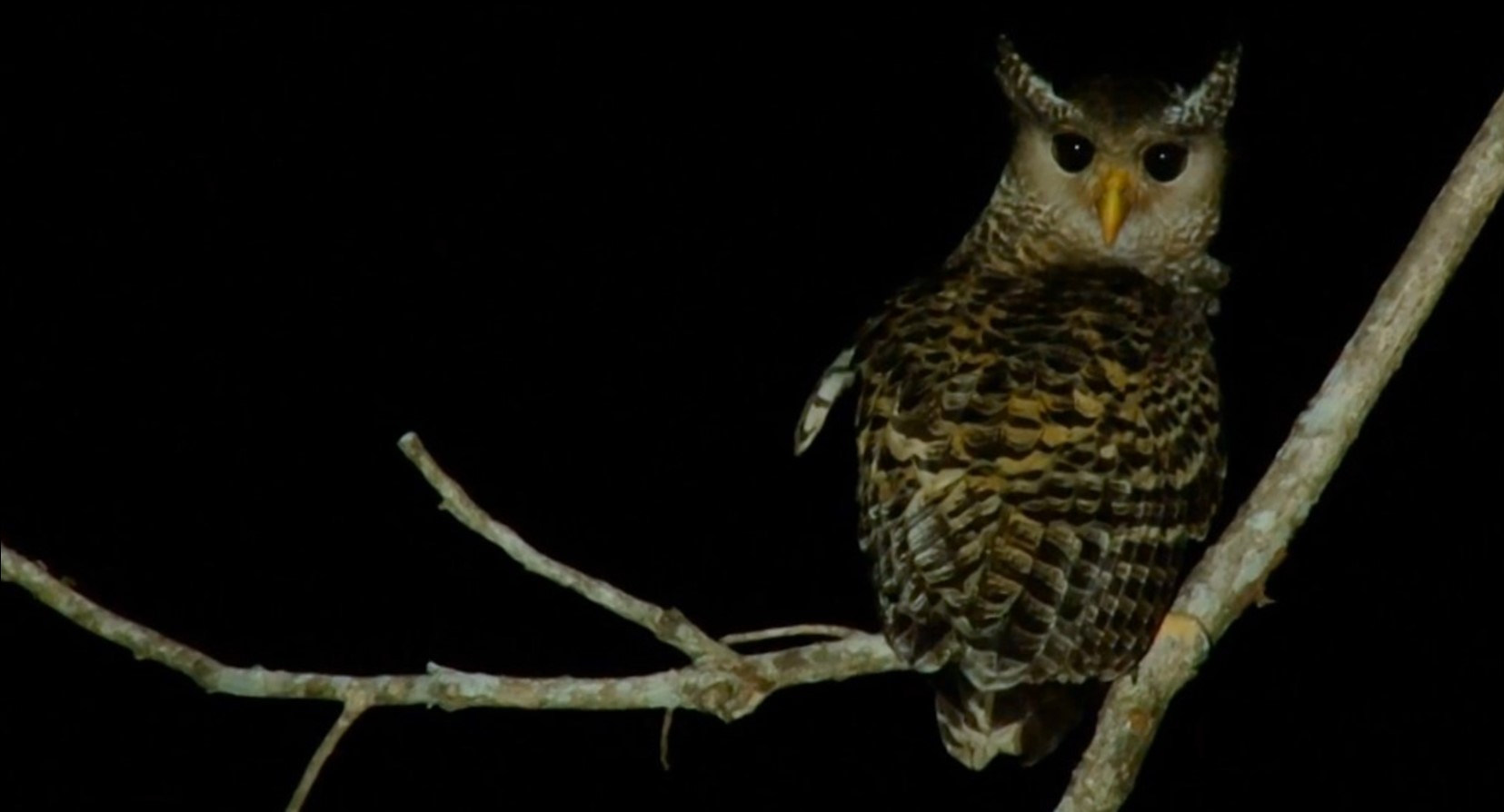 |
|||
|
Click the image to hear the cry.
|
|||
 Menusha has been staying with us for several months. She is working for an NGO assisting at-risk youth in Colombo. Her work is almost entirely online, and it is very convenient for her to be able to use our internet connection, as well as our extra laptop stand and office chair, Moreover, her presence has been invaluable to us. She has helped us immensely in mediating cultural differences and resolving potential misundeerstandings. Having studied at an international universties in Bangladesh and the UK, she has a lot of experience in cross-cultural communication, and she is able to assist us in our dealings with Sri Lankan issues. Also, in that we still can neither speak nor read Sinhala, she is an invaluable translator. Michelle and Leo are also grateful that she is here, and they love her almost as much as she loves them! When Leo was attacked by a polecat in December. Menusha and Ashoka diligently and sweetly cared for him, accompanying him on visits to the clinic, treating his wound, and showering him with much needed affection.
Menusha has been staying with us for several months. She is working for an NGO assisting at-risk youth in Colombo. Her work is almost entirely online, and it is very convenient for her to be able to use our internet connection, as well as our extra laptop stand and office chair, Moreover, her presence has been invaluable to us. She has helped us immensely in mediating cultural differences and resolving potential misundeerstandings. Having studied at an international universties in Bangladesh and the UK, she has a lot of experience in cross-cultural communication, and she is able to assist us in our dealings with Sri Lankan issues. Also, in that we still can neither speak nor read Sinhala, she is an invaluable translator. Michelle and Leo are also grateful that she is here, and they love her almost as much as she loves them! When Leo was attacked by a polecat in December. Menusha and Ashoka diligently and sweetly cared for him, accompanying him on visits to the clinic, treating his wound, and showering him with much needed affection.
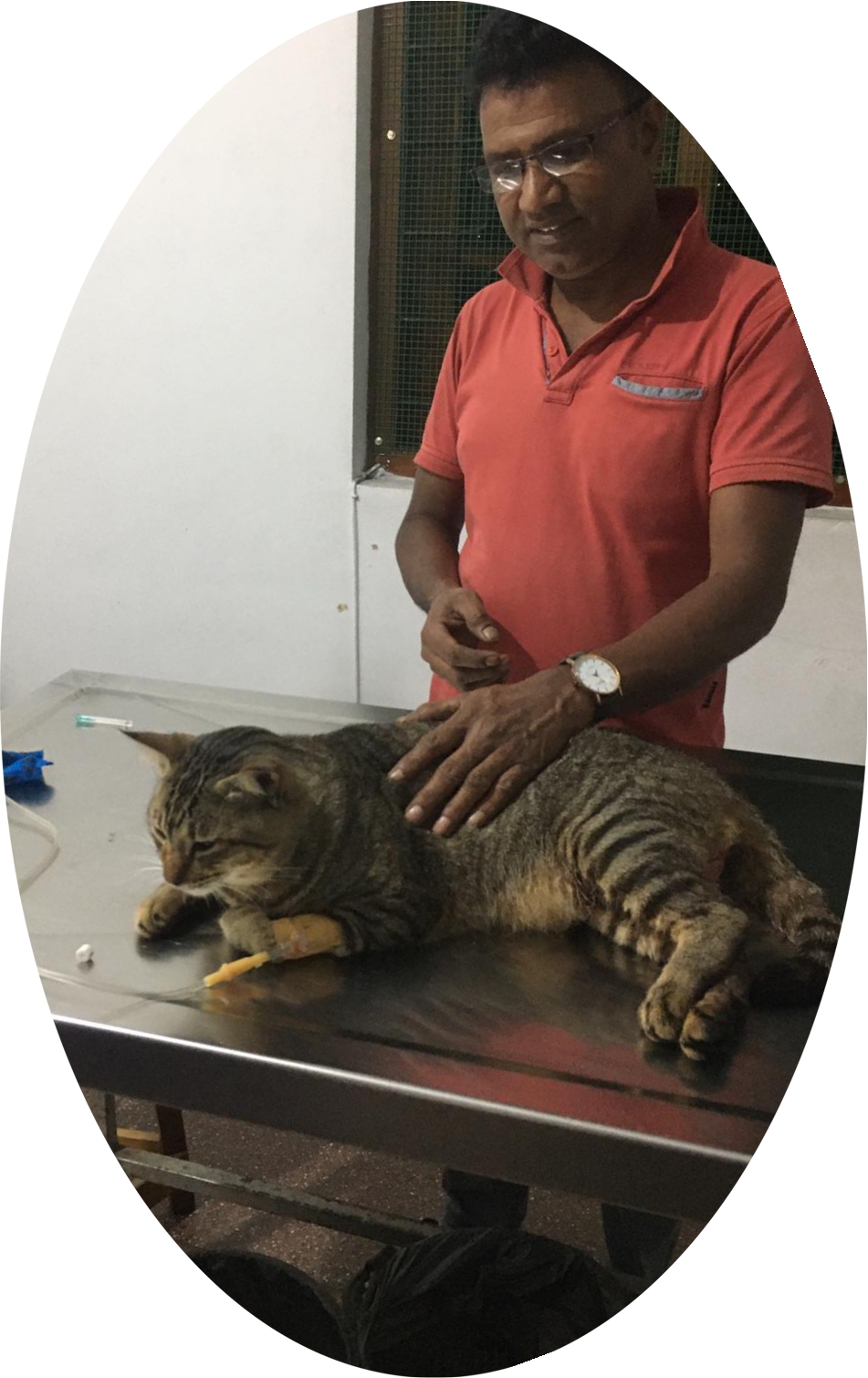 |
 |
 |
|
 Our ESL ZOOM class began in November and meets on Friday. Our text has been The Buddha's Eight Great Victories. All the students are Burmese, Chinese, Sri Lankan, and Vietnamese monks and nuns, living in Sri Lanka, China, Vietnam, and Myanmar . It has been very interesting to examine the stories critically and to discuss them in depth, Due to the lack of paper in Sri Lanka (the government's excuse for postponing the election) the book still has not been published in print, but the Kindle edition is available at Amazon.
Our ESL ZOOM class began in November and meets on Friday. Our text has been The Buddha's Eight Great Victories. All the students are Burmese, Chinese, Sri Lankan, and Vietnamese monks and nuns, living in Sri Lanka, China, Vietnam, and Myanmar . It has been very interesting to examine the stories critically and to discuss them in depth, Due to the lack of paper in Sri Lanka (the government's excuse for postponing the election) the book still has not been published in print, but the Kindle edition is available at Amazon.
We haven't had any in-person classes since the beginning of the pandemic. Now with the national crisis, we wonder whether there will be any in the future. In a national strike on March 1, everything shut down. The protests and the government's reaction are affecting the universities, and no one knows what will happen in the field of education here. Nevertheless, we are immensely enjoying the class. In spite of the drawbacks of ZOOM--time lapse, impersonality, and periodic disconnections--the discussions have been lively. As always, we are learning much more from our students than we are teaching. We may be masters of English, but they are masters of the Dhamma, and that is, after all, much more important.
In order to help our students think outside the box, we begin each class with several riddles. We are pleased that, in almost every case, at least one student has responded with the correct answer. Here are two recent riddles:
|
What is greater than the Buddha and more evil than Mara? The rich don't need it; the poor have it; and, if you eat it, you will die.
ANSWER |
|||
|
What is always coming, but never arrives?
ANSWER |
|||
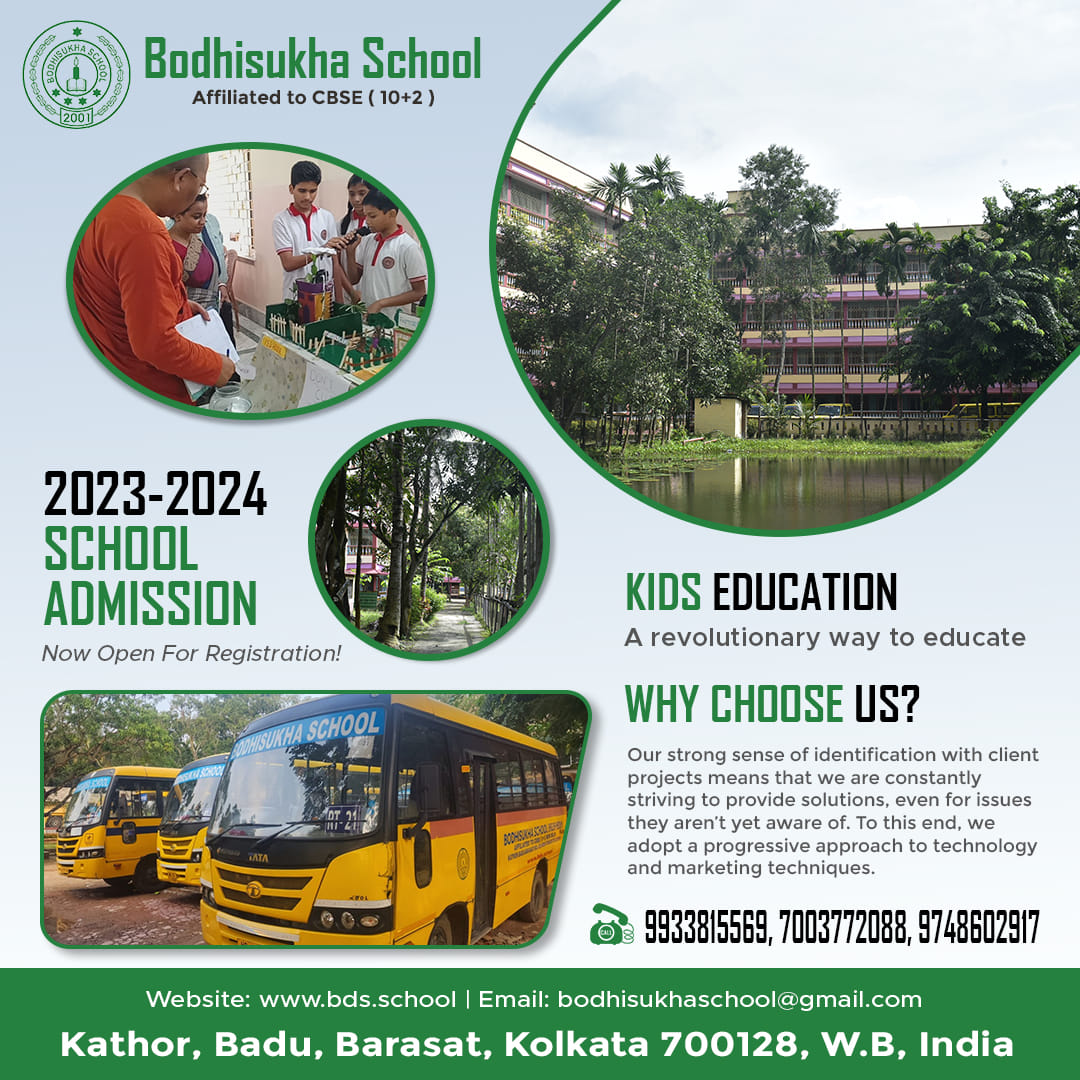 |
|
|
https://www.facebook.com/bodhisukhaschool
|
|
The minimum length is two months, but a longer period, up to one year, would be preferred. No monetary compensation is offered, but round-trip airfare, room and board, and a pilgrimage to some of the holy sites will be provided.
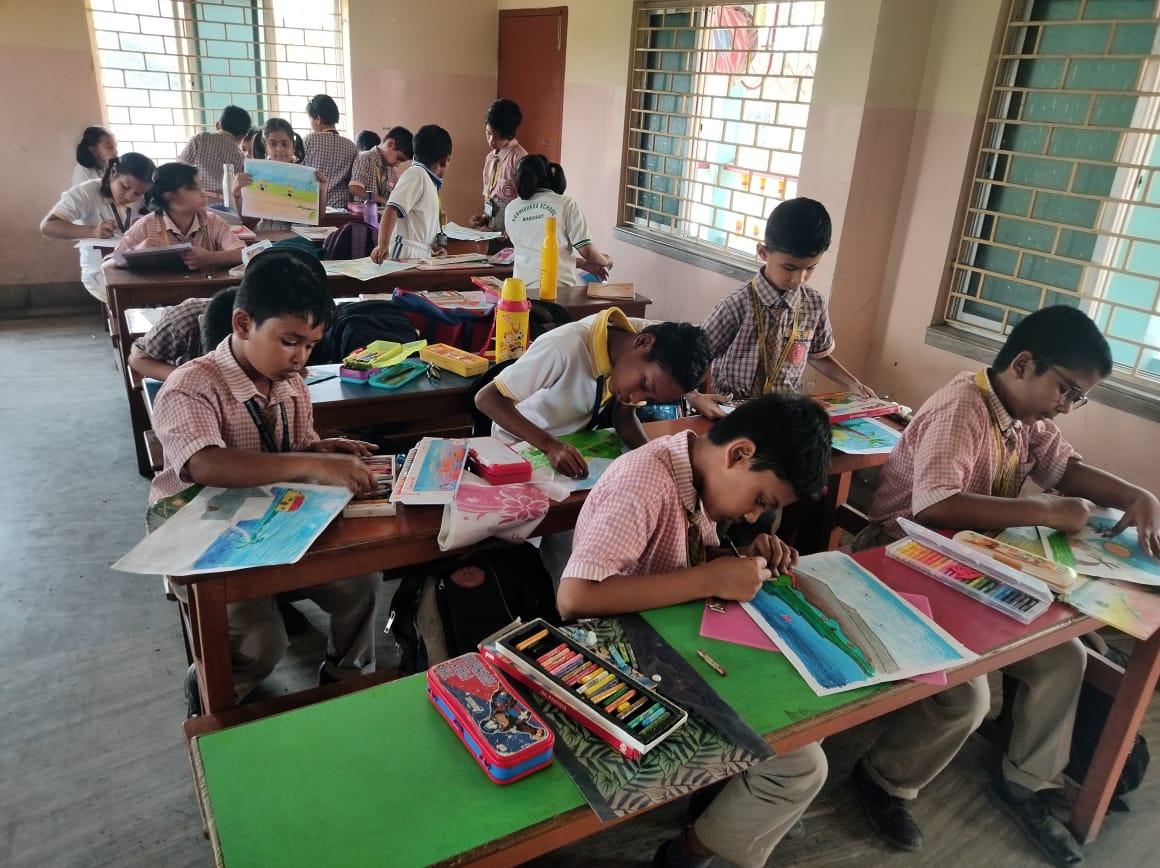 No formal certification is required, but the volunteer should have some ESL teaching experience. Native speakers will be given preference, but any volunteer with an excellent command of English, both reading and speaking, will be considered.
No formal certification is required, but the volunteer should have some ESL teaching experience. Native speakers will be given preference, but any volunteer with an excellent command of English, both reading and speaking, will be considered.
The schedule will be four class periods per day, five days a week. Each class has 45 students. Classes may range from Grade 1 to Grade 11. To some extent, volunteers will be asked to follow the prescribed textbooks, with increased conversational practice. It may also be possible to include lessons with songs, drama, etc. If the volunteer is interested and able, extra-curricular activities could be arranged.
The volunteer would apply for a multiple-entry "Entry Visa," for which Bodhisukha School will provide sponsorship papers. This visa can be extended to six months or one year, as required.
The first volunteers will begin in April 2023, but service could begin whenever it is convenient for the volunteer.
Any qualified individual who is interested in this program should send his or her resume (CV or Curriculum Vitae) to Ven. Dr. Nando Batha <ndbatha@gmail.com>.and to us <buddhist@brelief.org>
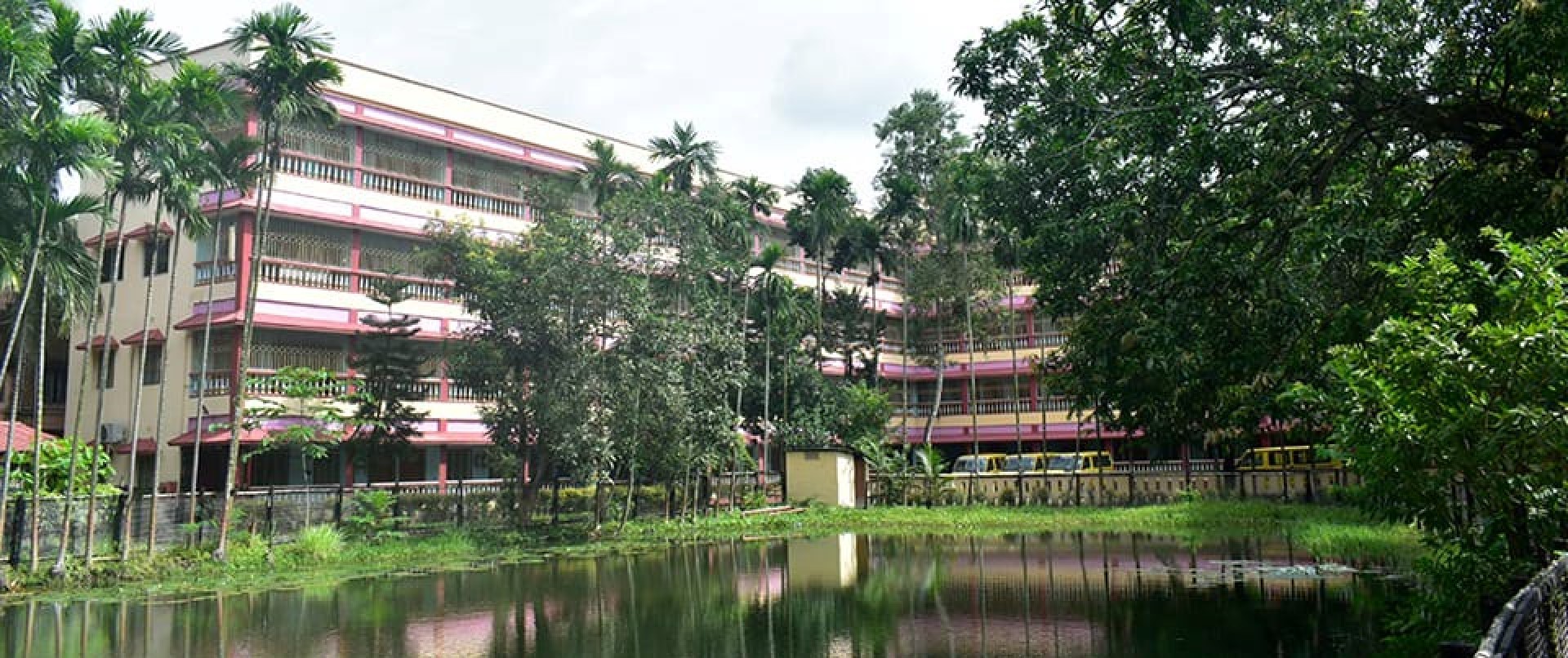
 |
On February 27, our Dhanmma friends, Ven. Ananda, Jinxing, and his wife, Jeaner, from Singapore, dropped in for a short visit. They are traveling around Sri Lanka on a dana tour with several local monks, offering food, books, and school supplies to monasteries and villagers. In addition to rescuing 35 cows from slaughter, they have also dug wells and installed water systems in several locations. We were very encouraged to learn of their activities, which dovetail nicely with ours, and we look forward to cooperating with them in several projects. One program that Ven. Ananda is interested in and which we hope to support is with a drug rehab center near Kandy. Some of the young men who have completed their rehab are reluctant to return to their homes for fear of falling in with their old friends and bad habits. Instead, they wish to enter a meditation center or even to ordain as novices. From Sri Lanka, Jinxing and Jeaner were going on to Nepal, so we introduced them to Ven. Ani Tsundue. It is wonderful that they will be able to get together. We sincerely believe that all good people should know each other! |
||||||||
|
Liasten to Ven. Ananda's
Dhanmma Lesson (20 minutes) |
Liasten to the monks
chanting Paritta (5 minutes) |
||||||||
 |
|||||||||
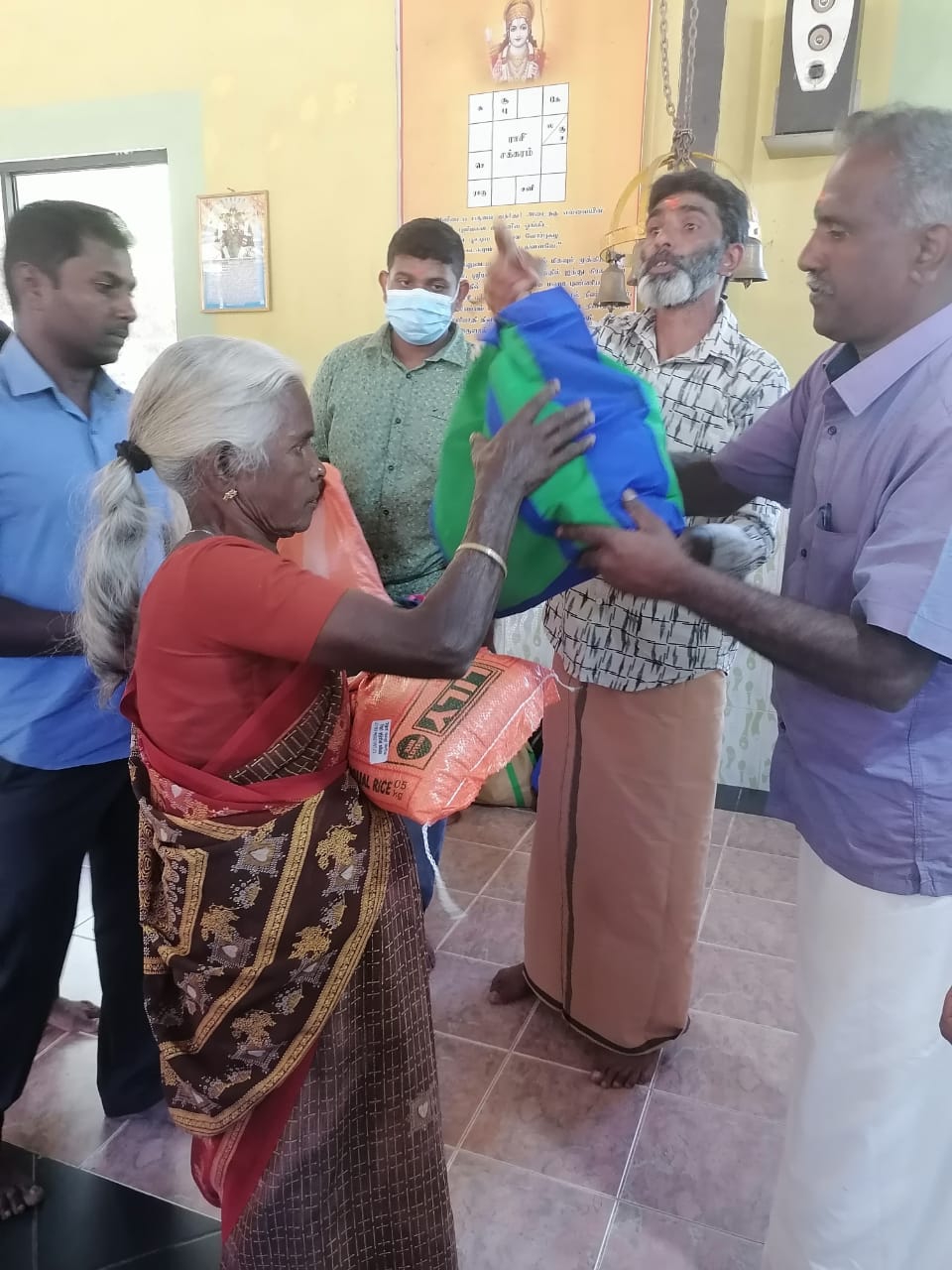 |
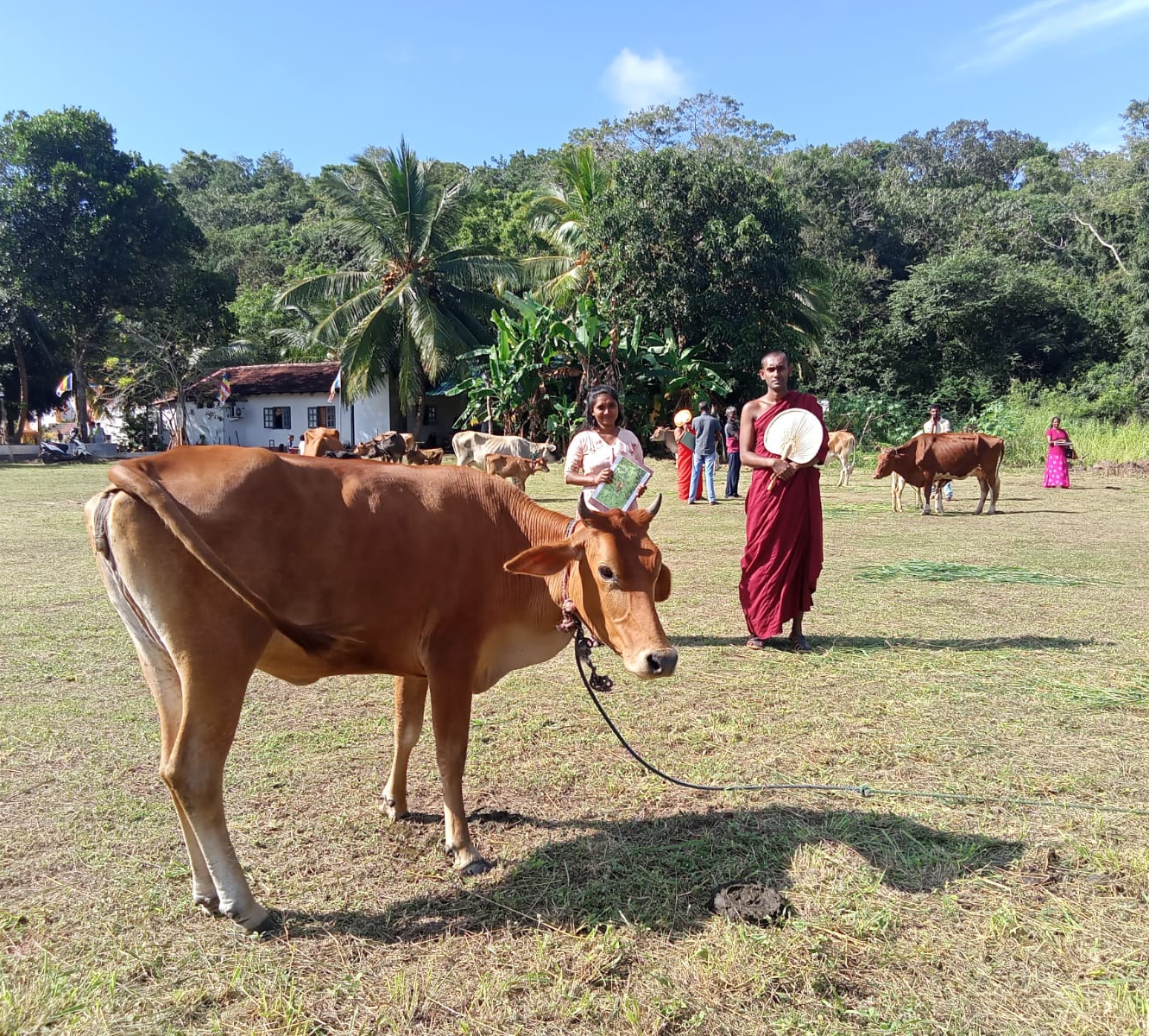 |
||||||||
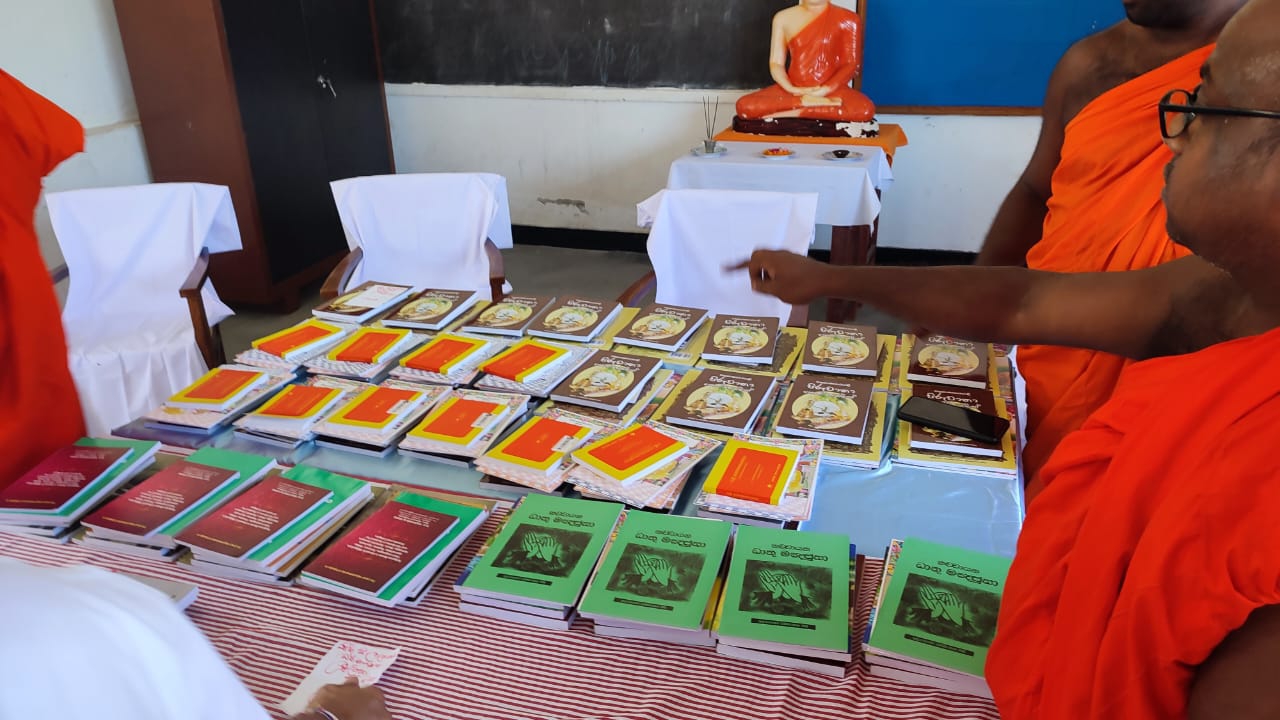 |
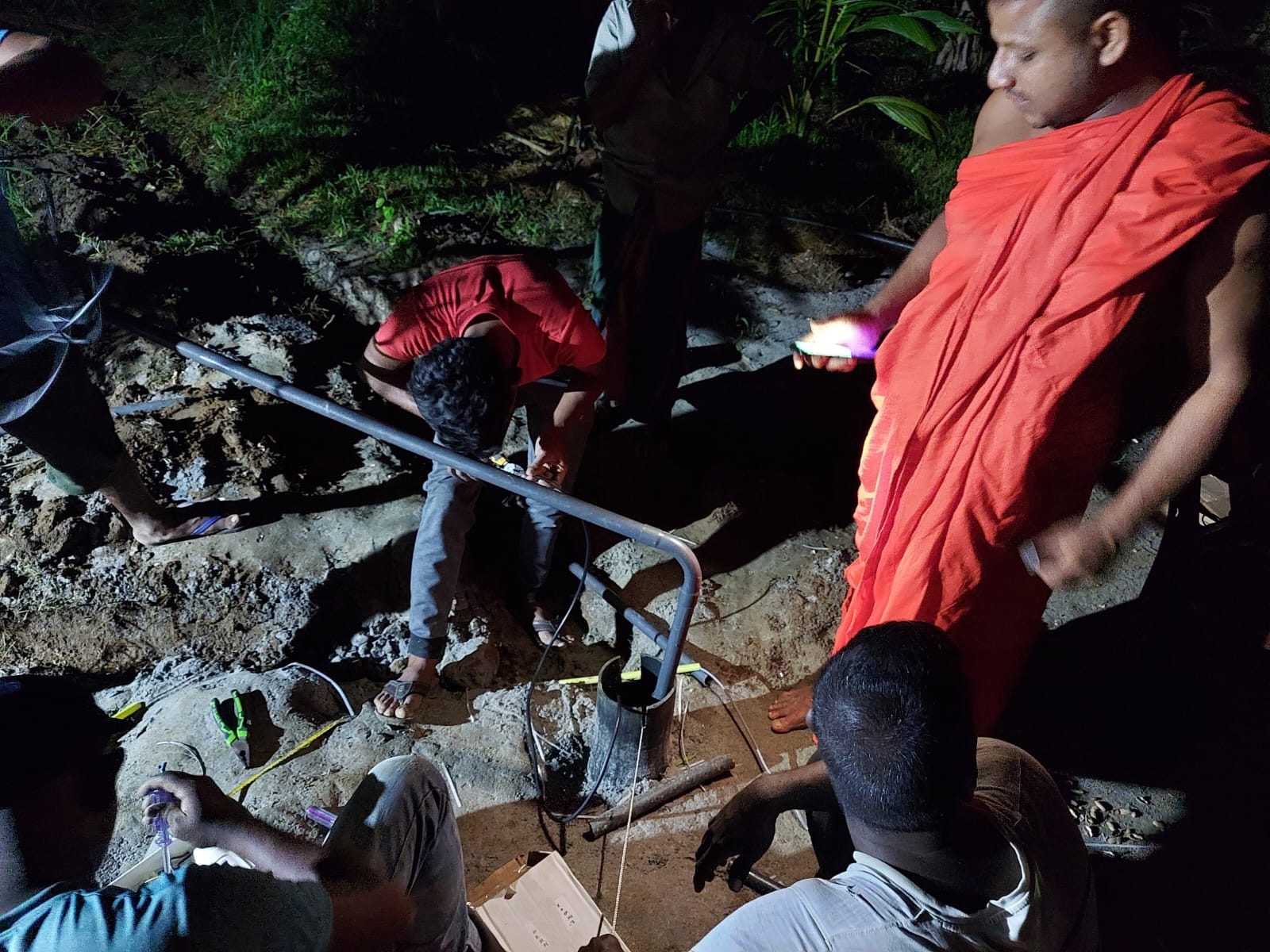 |
||||||||